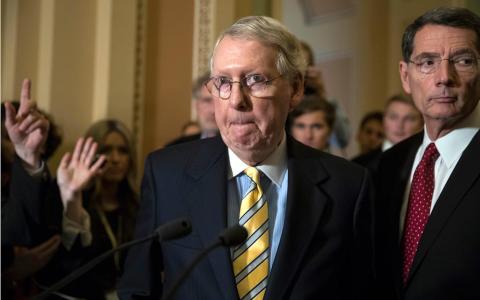
The Senate will return to Washington Monday to work on a multi-billion dollar coronavirus package as the number of cases across the country continues to grow, the Trump administration struggles to coordinate its response and Wall Street slides further into bear territory.
The Senate is expected to take up this week the massive bipartisan emergency package from the House to address the pandemic, after canceling its week-long recess. But much uncertainty remains over timing and logistics, despite mounting public pressure and the stock market taking a serious hit as the global pandemic continues to spread and daily life in the U.S. is severely disrupted.
It’s also unclear how swiftly the Senate will act, once the House finishes up. Mnuchin is expected to attend the Senate Republican lunch Tuesday — suggesting that he may need to sell the deal to some GOP members.
Senate Majority Leader Mitch McConnell (R-Ky.) said Sunday evening that “senators on both sides are carefully reviewing the details and are eager to act swiftly to help American workers, families, and small businesses navigate this challenging time.”
"It doesn't go far enough and it doesn't go fast enough," Cotton said. "Most of the measures in this bill are something that the senators will support, I believe. ... But we worry that the bill setting up a new and complicated system relying on businesses giving paid sick leave and then getting a refundable tax credit that won't move quickly enough and could put pressure on those businesses to lay workers off."
Sen. Ron Johnson (R-Wis.) said in a statement that he hopes the Senate “will approach this with a level head and pass a bill that does more good than harm — or, if it won't, pass nothing at all.”
While the Senate waits on the House to work through its technical corrections, it will spend Monday focused on moving forward with legislation to renew and reform provisions in the Foreign Intelligence Surveillance Act. Those provisions expired over the weekend and McConnell is pushing the Senate to move quickly. The Senate as of now must first deal with renewing the FISA provisions before tackling the coronavirus package unless lawmakers take up the emergency bill by voice vote.
But Sen. Josh Hawley (R-Mo.) urged the Senate Sunday to prioritize the coronavirus package over FISA.
“FISA needs to be carefully reviewed. That takes time. That can wait," the Missouri Republican tweeted. "The emergency response to [coronavirus] should be the first order of business in the Senate tomorrow. There is no reason for this to take days & days."
Meanwhile Senate Democrats spent the weekend criticizing McConnell for sending the Senate home Thursday, one day before House Democrats reached a deal with the Trump administration on the emergency package. Senate Minority Leader Chuck Schumer (D-N.Y.) is calling on McConnell to take up the House legislation immediately on Monday, without changes.
“It was disgraceful that Leader McConnell left town last night ... We could have had this done already, but he left,” Schumer said over the weekend in New York.
Senate Democratic Whip Dick Durbin (D-Ill.) urged McConnell to have the Senate pass the House coronavirus package and a short-term FISA extension by unanimous consent, given the recommendations from health officials to practice social distancing.
“Senators and staff are working to serve their states locally as best they can, and with unanimous consent for these measures there is no valid reason to force extra travel this week," Durbin said. "Given the fact that we can and should pass the Coronavirus package, and any subsequent recommended bipartisan fixes to it, by UC immediately, your decision to call us back to Washington this week is unnecessary."
The confusion about when the Senate will act on the legislative package comes as the number of coronavirus cases in the United States jumped to more than 3,500 over the weekend. And on Sunday, the Centers for Disease Control recommended Americans cancel or postpone gatherings of 50 or more people for eight weeks.
This article originally appeared on Politico.



